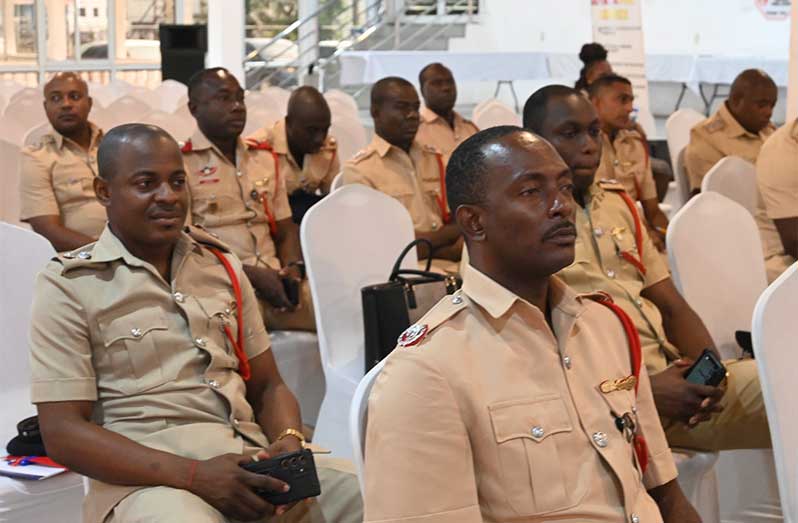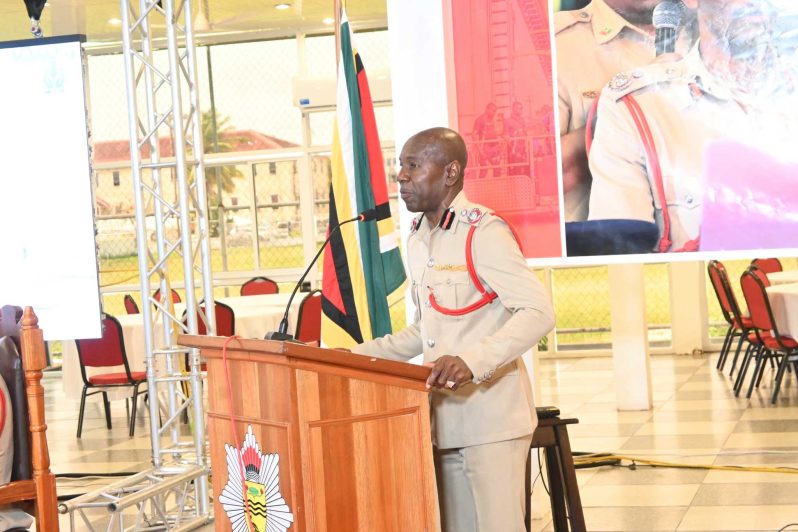THE Guyana Fire Service (GFS) is making bold strides in its mission to modernise its operations and improve emergency response, proudly boasting of having the most advanced firefighting equipment in the Caribbean.
This was revealed by Chief Fire Officer, Gregory Wickham, during his address at the opening of the GFS Senior Officers’ Conference on Thursday.
The conference is being held under the theme “Fostering Community Collaboration for Enhanced Emergency Response.”
Wickham stated that the Fire Service has undergone a major transformation, with the acquisition of state-of-the-art firefighting equipment, new fire tenders, and improved infrastructure.
These investments are part of an aggressive initiative to not only reduce fire response times across the country but also to earn the trust and confidence of the Guyanese people.
Wickham expressed gratitude to the government for allocating $1.2 billion to the GFS in the 2025 national budget. He said the funding will help ensure the fire service delivers excellence by equipping it with the necessary resources to effectively manage operations and safeguard lives and property from fire-related destruction.
“Over the last year, we acquired a significant amount of firefighting equipment. We would have expended $674 million in acquiring these pieces of equipment,” Wickham stated.
The Chief Fire Officer confidently declared that the GFS is leading the Caribbean in modern firefighting tools, highlighting the service’s acquisition of two Bronto Skylifts—a specialised firetruck designed for aerial firefighting and rescue operations.

The Fire Chief also pointed out that more fire stations are being constructed across the country, particularly in rural and hinterland areas where fire response was previously limited. He said the decentralisation of services is expected to further improve response times and accessibility.
He explained: “We are in the process of building six new fire stations across the country. They are being built in areas that, for many years, did not have such infrastructure. They are being built in Essequibo and Corentyne. These stations are located there to ensure that we reduce our response time for those who may be in distress and to gain the confidence of every citizen.”
He noted that the GFS has recognised the need for greater community engagement.
As part of this effort, Wickham disclosed that 40 pickup-type fire tenders have been distributed to each Neighbourhood Democratic Council (NDC) to ensure a faster initial response in the event of a fire, significantly reducing response time.
In addition, the Chief Fire Officer emphasised that modernisation is not limited to equipment alone. “Without proper training, it does not matter how much equipment and how many tools we acquire — we’ll be unable to achieve our specific goals.”
According to him, the Fire Service is also investing in the continuous training of its personnel, focusing on international best practices in firefighting, rescue operations, and emergency medical response. Firefighters have also been equipped with cutting-edge personal protective gear, ensuring their safety and enabling them to operate more efficiently during emergencies.
He said the GFS, over the years, has conducted training sessions for staff in hazardous materials (hazmat) response, foam management, aerodrome, supervisory management and mental health.
Training sessions are being held locally and overseas, with a focus on empowering firefighters with both theoretical knowledge and practical skills.
“We’ve had the success of three of our officers undergoing and completing training at an internationally recognised university in forensic fire investigation. We are now better prepared to deal with any eventuality of that sort,” he stated.
Public engagement is another key area of focus for the GFS. Through community outreach programmes, Wickham noted that the GFS aims to foster a more fire-conscious society.
These efforts, according to him, are geared toward education and prevention, helping citizens understand fire risks, how to respond to emergencies, and how to work with fire personnel during a crisis. “Over the year, we would have touched no less than 15,000 persons with this drive of fire prevention and fire safety through outreaches and kids’ camp.”
On the operational side, Wickham reported that the GFS responded to over 5,000 fire calls over the past year.
He also highlighted the critical role of Emergency Medical Technicians (EMTs) within the Fire Service, noting that they responded to more than 10,000 emergency calls and successfully delivered 19 newborn babies.
With its latest equipment and expanding capabilities, the Fire Chief assured that the GFS is ushering in a new era of preparedness, with the protection of life and property remaining its top priority.



.jpg)








